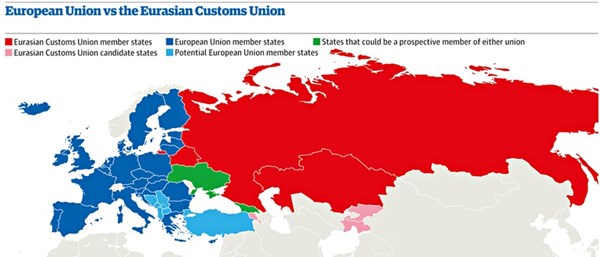EEU Countries do not Support Cutting Economic Ties with Ukraine
The member states of the Eurasian Economic Union (EEU) composed of Kazakhstan, Belarus, Kyrgyzstan and Armenia do not support Russia abandoning the free trade zone with Ukraine, which operates within the Commonwealth of Independent States (CIS), as reported by Viktor Khristenko, the Chairman of the Board of the Eurasian Economic Union, after the meeting of the Presidents of the EEU member states in Moscow.
"Within the next six months the legal mechanisms that allow national governments to exercise their rights as upheld by the Union should be worked out; specifically, the right to unilateral action at the national level within the supranational system and the right to respond, which must include effective administration," Khristenko said.
According to him, "During this period the implementation and outcomes of the agreement between Ukraine and the EU will be monitored. Also, the development of the legal and technological tools related to the exchange of information will be under strict control."
In addition, the President of Belarus, Alexander Lukashenko, said that the implementation of the Agreement on the Free Trade Zone between Ukraine and EU was briefly discussed by the Presidents of the member states of the Eurasian Economic Union. "In the first quarter we will have to decide with Kazakhstan and Belarus how to support Russia as our ally. The appropriate decree was signed by the President of the Russian Federation. Then, within six months, we will reach a full declaration as to which goods will be moved under the EEU," he said.
"On January 1, 2016 an Agreement on the Free Trade Zone between Ukraine and the European Union will come into force. There is a serious situation regarding the free trade area within the CIS. Not only Russia, but all of us have some concerns about this," Lukashenko said. According to Lukashenko, "There may be a time when Ukranian products will be substituted by products of the European Union in Ukraine. So, Ukrainian products will rush to our territory. Further, if we do not protect our goods, goods from the European Union at zero duty, once in Ukraine, fall into all the CIS by the free trade zone."
Putin has signed a decree suspending the Agreement on a Free Trade Zone between Russia and Ukraine as of January 1, 2016, which had operated within the framework of the CIS Free Trade Area.
However, from January, 1 2016 the Agreement on a Free Trade Zone between Ukraine and the European Union will come into force. In this regard, the President of Ukraine, Petro Poroshenko, expressed his confidence that the FTA with the EU will compensate for Ukraine’s economic losses resulting from the closure of the Russian market in the coming years.
